- Home
- Laura Thalassa
War (The Four Horsemen Book 2) Page 28
War (The Four Horsemen Book 2) Read online
Page 28
From everything I’ve seen of these parts, I’d say the people here were suffering long before War came around. They don’t need any more pain.
Seeing my face, War says, “Mansoura must fall, and I will be there.”
I feel my heart plummeting, plummeting. War had put off his godly duties over the last week. I had stupidly hoped he might put them off for longer—much longer.
“You don’t have to,” I whisper. “You could stop.”
He pulls me in close and steals a kiss before I can push him away. “For you I nearly would.”
Nearly.
The last week managed to lure me into a false sense of reality, but the dream is over.
I knew things weren’t going to change. What I hadn’t realized is that I’m suddenly not okay with that.
Be brave, Miriam.
If I want the world to change, I’ll have to do something about it.
“There is something I want to know,” I say carefully. “If you can judge men’s hearts, can you see whether they intend to do evil?”
What are the limits of your abilities, dear horseman?
War’s brow furrows at the change of subject. “Not even I can see the future, Miriam—nor can I read men’s minds. I can only understand their basic essence. And even that can alter with time and intent.”
I trace one of War’s crimson tattoos; the markings look like spilled blood on his chest.
“Do you know my heart?” I ask carefully.
“I do,” he says.
“Is it good?”
“It’s good enough.” For me, the silence seems to add.
It’s good enough.
Good enough for the horseman to believe I truly surrendered to him back in Port Said, which is all he ever really wanted from me, anyway.
The thing is, a good enough heart is not the same as a good one. And that’s unfortunate for War, because a good heart might always tell the truth, but a good enough one won’t.
When I told him I surrendered, well—I lied.
I’ve given up nothing.
The explosion roars through my ears, the force of it knocking me into the water.
Darkness. Nothing. Then—
I gasp in a breath. There’s water and fire and … and … and God the pain—the pain, the pain, the pain. The sharp bite of it nearly steals my breath.
“Mom, Mom, Mom!”
Can’t see her. Can’t see anyone.
“Mom!”
“Miriam!”
I gasp awake, clutching my throat.
War stares down at me, his eyes like onyx. A line forms between his brows. “You were having a nightmare.”
I take several deep gulps of air.
A nightmare. Right.
I wet my lips, sitting up, and the horseman moves back a little, giving me space. My skin is damp with sweat, and strands of my hair are plastered to my cheeks.
It’s been weeks since I last had this nightmare. I had almost forgotten that before War, this particular memory had all too frequently haunted my dreams. I don’t know why it’s decided to take a backseat until now. Maybe lately my mind has just been haunted by newer and more grotesque images.
“What were you dreaming of?” War asks. Just the way he says it makes me think that the horseman doesn’t dream—or that if he does, it’s a very different experience from my own.
My finger traces the scar at my throat. “It wasn’t a dream. It was a memory.”
The water rushes in—
“Of what?” War’s voice is hard as flint, like he wants to do battle with something as insubstantial as a memory.
I swallow.
Might as well tell him.
“Seven years ago Jerusalem was getting overtaken,” I say. Rebels and zealots had fronted an attack on my city. “My mother, sister, and I were escaping. No one was safe in the city, particularly not a half-Jewish, half-Muslim family.”
Those days of tolerance and progress that my parents once spoke of had been snuffed out like a candle.
“My family made it to the coast.” I can still see the shuffle of bodies on the beach. There were so many other families just like ours, desperate to escape war-torn Israel for another place—any place.
“We piled into a motor boat. By then, most engines in Israel had stopped working, and the ones that were still in operation were unreliable at best.”
That was seven years ago. Since then, all engines had stopped running.
“My mother knew it was dangerous, that something could go wrong, but it was our only option.”
Europe had closed its borders. They didn’t want foreigners—particularly not ones from the east and south. In their minds we’d steal their jobs and eat their food and overwhelm their precarious economies.
If we wanted to get through their borders, we were going to have to do it illegally, and this treacherous boat ride was the only way to do that.
“The boats were … bad. They were narrow and rickety, but worst of all, they relied on motors for propulsion.
“I didn’t want to get in ours. I was so afraid the motor was going to give out right in the middle of the open ocean. I was afraid I’d die at sea.”
War listens, rapt, his eyes searching my face as I speak.
“In the end, my mother and sister shamed me into stepping into the boat. They knew I didn’t really want to leave Israel—or New Palestine as it was starting to be called.” That was where my father died, where I grew up. It held all my memories. I knew we needed to leave, but I didn’t want to. It seemed cruel that I had to give this up too. We’d already lost everything else.
“We made it off the beach. The engine was making funny noises, but we got away from land at least.”
I pause.
Some memories are lost to the sands of time, but others, like this particular one … I could live to be a hundred and I’d still never forget.
“The explosion was a surprise.” I didn’t know engines could explode. “One moment I was sitting there, alongside my mother and sister, and in the next I felt heat and pain as I was thrown into the water.
“My backpack had been wrapped around my ankle.” That bag was full of the last of my earthly possessions. “I remember it dragging me down.”
My lungs pound. The sunlight above me grows dim even as I struggle.
“I tried to get it off, but I couldn’t. I was sinking, and I couldn’t get back to the surface.”
I open my mouth to cry for help.
The water rushes in—
I glance down at my fingers. “I don’t know how I survived. I really don’t. I thought I drowned in those waters.”
“But you didn’t,” War says, his voice soft.
I nod. “When I came to, I was onboard a fishing boat. The fishermen said they saw me floating in the water alone, far from any wreckage.”
“I don’t know what happened to either my mother or sister. I don’t even know if they’re alive.” My voice breaks.
War leans forward, cupping the side of my face. “I vow to you, wife, we will find what’s become of your family.”
I nearly stop breathing.
It’s what I’ve always wanted. What I could never quite attain when I was just a weapons dealer in Jerusalem.
War couldn’t give me a more precious gift.
Does he realize it?
My gaze slips down to his lips. I lean forward and kiss him. “Thank you.”
And then I show him I mean it.
Chapter 41
It’s been a while since I stopped in to see Zara. A big part of my hesitancy has been trying to explain to her that I’m now banging the horseman that wiped out her hometown and most of her family. I can’t imagine that conversation going over too well. But I’ve put this visit off for too long.
As soon as I leave War’s tent, the dead congregate around me, smelling like a demon’s asshole and looking even worse. Death does no one favors.
I frown at them.
I begin to walk, and the zombi
es fall into formation around me like some sort of undead security force.
I pause. “War!” I call out behind me.
Several seconds pass, then the horseman steps out of his tent, his trousers slung low, his dark hair sex-tousled, his rippling torso highlighted by the morning sun. A cup of coffee is in his hand, and he wears a loose smile on his face, his white teeth stark against his olive skin. It’s gross just how gorgeous he is.
“Reconsidering seconds?” he asks, his eyes laughing at me as he takes a small sip. He’s not talking about breakfast.
I give him a reproachful look. “I have to be friends with the dead now?” I gesture to the zombies.
His smile widens a little at that, his eyes bright. “Consider it a working relationship.”
I huff, walking back to him, the revenants at my heels. “No one’s going to kill me.”
“I know,” he agrees. “Because no one’s going to want to come within five meters of those men.” He nods to the zombies.
Ugh. “I just want to visit my friend.”
War’s expression darkens. “The one who tried to kill me? The same one whose boy you forced me to save?”
I look heavenward for patience. “It doesn’t matter who I’m visiting. I need your word that the dead won’t come into any tents I enter—or hover too close by.”
The horseman scrutinizes me. “What is the point of having guards if they cannot be around to protect you?”
I want to tell him that the bodyguards were his idea, not mine, and that I don’t give a flying fuck whether I even have guards. But knowing War, that kind of logic would land me with twice as many zombie nannies, all of whom would insist on entering Zara’s miniscule tent.
I rub my face. “Please War.” I drop my hand. “I’ll go along with your bodyguards. Just give me a little freedom. I need friends.”
He stares at me for a long time, then turns his attention to the undead who’ve congregated around me. Finally he inclines his head. “For your soft heart.”
I release a breath. “Thank you.” With that, I turn on my heel.
I feel those violent eyes on me as I walk away, the dead closing ranks around me once more.
The phobos riders that live in War’s area of camp stop and stare (somewhat hostilely) at me and my macabre bodyguards as I pass them by. But the real looks come when I enter the main area of camp.
Men and women openly gape at me, their eyes darting from dead man to dead man. And the same children who I’ve seen handle weapons now scream and flee at the sight of the walking dead.
I’m regretting this trip already.
By the time I get to Zara’s tent, she’s already standing outside of it, her arms crossed and an eyebrow raised.
“Why is it that I always hear about you before you arrive?” she says by way of greeting.
“I think I’m just unlucky.”
She eyes the dead men. “They’re not coming in my tent,” she warns.
I glance at them, suddenly unsure how I’m supposed to get them to beat it. “I’ve arrived,” I tell them. “You can back off now.”
In response, they spread out, flanking the area and causing a nearby woman to scream and drop the clothing she was washing. The rest of the women loitering along this row of tents watch us curiously.
Zara jerks her head towards her home. “Why don’t we chat inside?”
I follow her in, and in the dim, warm confines of her tent, I see Mamoon playing with some faded plastic toys and a well-loved teddy bear.
“Mamoon, say hi,” Zara says.
“Hi,” he replies without looking up.
Zara purses her lips together, and she looks a little like she wants to cry.
“How’s—” I jerk my head to her nephew, “it going?”
She sighs. “Hard. It’s really, really hard. But I have more than what most people here do, so I’m counting my blessings.” She takes a deep breath, her emotional walls coming up. “But that’s not what I want to talk about right now.” Her eyes move over me. “Where have you been for the last week? You disappeared on me.”
I don’t want to say it, I really, really don’t.
Her eyes pass over me again. “You screwed him, didn’t you?”
I sit down hard and nod.
“Yeah.” I fucked him good.
“Well?” she adds. “Was it worth it?”
I glance at her nephew.
“He has no idea what we’re talking about. It’s fine.”
Not so sure about that …
“So?” Zara presses. I can’t tell if she’s angry. She sounds annoyed, and she seems a bit on edge, but then again, ever since I’ve known her, Zara’s always been a bit edgy.
I give a humorless laugh. “You mean did I enjoy it?” I give her a look. “Yes. I did.” It’s problematic how much I’ve enjoyed it.
“And now you feel guilty?” she asks.
I level a look at her. “Naw …”
The corner of her mouth curves into a sardonic smile. “I don’t judge you, you know,” she says, sitting down next to me.
I chew on my lower lip. “I wouldn’t blame you if you did,” I say.
She takes my hand, squeezing it tightly. “You convinced that beast to save—” Her voice breaks. Zara nods to her nephew. “War’s killed everyone I loved—except for one person, and that was only because you got through to him. So no, I don’t blame you for screwing the monster, though I’m sorry you’re the one forced to do the deed. I’d sooner saw his balls off, myself.”
I give Mamoon another desperate look, sure that between me and Zara we’re corrupting the poor boy’s ears.
“He saw his parents killed, he’s walked by executions, and now dead men are standing guard outside his tent,” Zara says. “A little sex talk is the least of my worries.”
Fair point.
“I made War a promise not to get in his way, and as much as I hate it, I intend to uphold that promise,” my friend continues. “So have your way with him and don’t think I’m going to cast my judgment on you or walk away from our friendship. I owe you a debt I can never repay. And who knows, maybe you’ll end up saving someone else’s little boy because of your … relationship.”
I give her a tight smile.
“Just don’t avoid me,” she finishes. “I missed your company.”
“Okay,” I say softly.
And that’s the end of the sex talk—at least for now.
For the next couple hours, Zara and I talk about everything and nothing. I could’ve sat with her and chatted the entire day away, but eventually my friend drags me and Mamoon out of the tent, towards a group of women gathered several tents down.
Mamoon keeps giving the zombies around us wide-eyed looks as Zara leads him on.
“They won’t hurt you,” I say. “They’re here to protect us.”
That’s a bit of a lie—they’re here to protect me and no one else—but I won’t let them hurt Mamoon, so it’s nearly the truth. And luckily, my words seem to take the edge off of the toddler’s fear.
The loose circle of women sits under a canvas shelter someone’s erected. They sit and chat while they mend clothes, weave baskets, and do other odd jobs that don’t require much concentration.
When they catch sight of our group, I see one woman slosh a cup of tea she’s drinking. Another gasps.
“What’s this?” another women demands of Zara. She doesn’t bother looking at me.
“War’s wife decided to join our group,” my friend replies, like it’s the most normal thing in the world.
The women grow quiet, each of them eyeing me, some curiously, others unkindly. One gives me a small smile. I recognize a face here and there from when I lived in this quarter of camp, but no one acts as though I was ever like them.
“Of course you’re both welcome,” one woman says a little stiffly. Her face warms when she sees Mamoon. “David is playing soccer with Omar if you’d like to join.” She points behind her, towards the end of the tents, where t
wo small boys are kicking a weathered ball around.
Mamoon glances up at his aunt, and when she gives a nod of her head, the little boy goes running off towards his new friends.
Zara keeps her eyes on him for several seconds after that, her face pinched with worry. There’s always something to worry about here—the soldiers’ cruelty, the numerous weapons scattered about camp, the sheer size of our tented city. A child could get swallowed up whole.
“Would either of you like some tea?” one of the women asks.
Zara blinks, moving her attention to the woman. “No thank you.”
“I’m good too,” I say.
I shoo my undead guards away as the group makes room for us in the circle. After a tense few minutes, conversation returns to normal.
“… I saw Itay go into her tent last night.”
Some tittering laughter.
“So that’s who was making her find God while the rest of us were trying to sleep.”
“Poor Ayesha next door has a child. Try explaining that one!”
Shocked laughter rolls through the group.
I listen to them, strangely fascinated. All around us, people are dying by the thousands, and yet here these women are, gossiping about someone getting laid.
“How’s War?” asks a woman, her curious gaze falling on me.
At first the question doesn’t even register. It’s not until the other women turn their gazes on me that I realize they all want to know about my sex life and oh my God I did not sign up for this when I decided to visit Zara this morning.
“What do you mean?” I say, faking ignorance.
The woman’s mouth curves into a smile. “Has he made you find God?”
Someone else chimes in. “Of course he has. Otherwise there wouldn’t be dead men guarding her.”
It’s painful how accurate that statement is.
“What I want to know,” another woman says, “is how good the horseman was at giving you a religious experience.”
Several of the women laugh; even Zara cracks a smile.

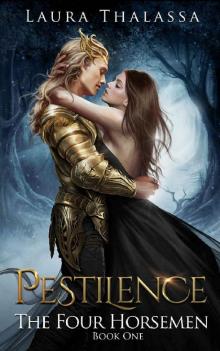 Pestilence (The Four Horsemen Book 1)
Pestilence (The Four Horsemen Book 1) War (The Four Horsemen Book 2)
War (The Four Horsemen Book 2)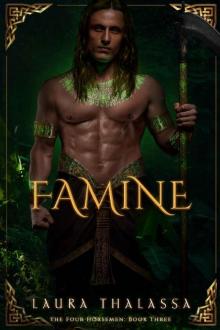 Famine (The Four Horsemen Book 3)
Famine (The Four Horsemen Book 3)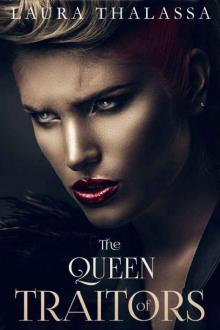 The Queen of Traitors (The Fallen World Book 2)
The Queen of Traitors (The Fallen World Book 2) The Unearthly (The Unearthly Series)
The Unearthly (The Unearthly Series) The Damned (The Unearthly Book 5)
The Damned (The Unearthly Book 5) The Coveted (The Unearthly #2)
The Coveted (The Unearthly #2) The Vanishing Girl
The Vanishing Girl Death (The Four Horsemen Book 4)
Death (The Four Horsemen Book 4)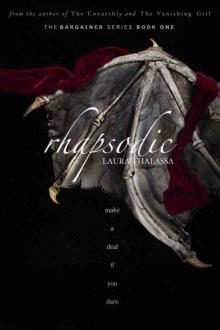 Rhapsodic (The Bargainer Book 1)
Rhapsodic (The Bargainer Book 1) The Curse Catcher (The Complex Book 0)
The Curse Catcher (The Complex Book 0)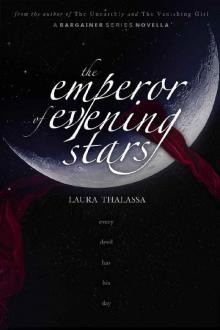 The Emperor of Evening Stars (The Bargainer Book 3)
The Emperor of Evening Stars (The Bargainer Book 3) The Forsaken
The Forsaken The Queen of All that Dies (The Fallen World Book 1)
The Queen of All that Dies (The Fallen World Book 1)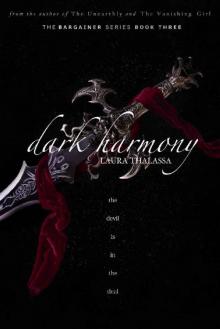 Dark Harmony (The Bargainer Book 3)
Dark Harmony (The Bargainer Book 3) Blood and Sin (The Infernari Book 1)
Blood and Sin (The Infernari Book 1)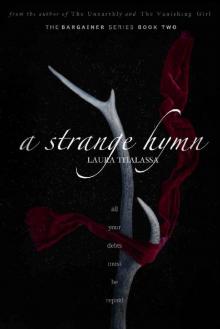 A Strange Hymn (The Bargainer Book 2)
A Strange Hymn (The Bargainer Book 2)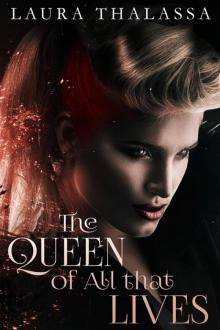 The Queen of All That Lives (The Fallen World Book 3)
The Queen of All That Lives (The Fallen World Book 3) The Cursed (The Unearthly)
The Cursed (The Unearthly)